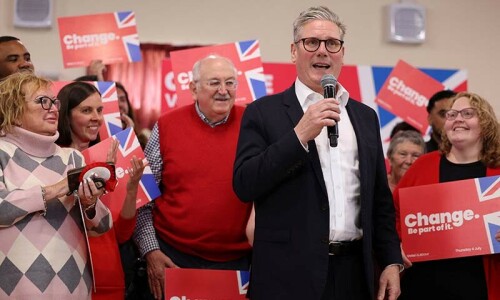IT has been ten days since the Labour party won a landslide in the UK’s general election and now the relish is slowly fading with practical considerations about challenges for the new government slowly gaining prominence. At the same time, an uncomfortable debate is unfolding in the country: how Muslims have voted?
The debate has been summed up as ‘Muslim vote’ — a catchphrase for the success of four pro-Palestine independents who trounced Labour candidates in Muslim-dominated constituencies across the country.
On the face of it, it is a polarised conversation dominated by extreme opinions. On one end of the divide is a political group called ‘The Muslim Vote’ (TMV) that advocates for a single-issue manifesto centring on Gaza and celebrates the victory of these independents.
On the other are writers like Jake Wallis Simons, the editor of the Jewish Chronicle and a Telegraph columnist, who describes the victory of pro-Palestinian independents as a “glimpse into a horrifying future” in which elections are “dominated by hostile sectarianism” — something he said “is a profound indictment of our fraying social cohesion”.
Muslims ‘not single-issue voters’
Not everyone agrees with the discourse painting Muslims as single-issue voters.
Writing for the Guardian, British writer Kenan Malik said Gaza was a “lightning rod” for Mulsim’s disaffection“, but the drift from Labour has been as much about domestic issues as sectarian politics.
“Whether employed in celebration or denunciation, the concept of the ‘Muslim vote’ is dubious,” said Mr Malik.
He pointed towards the dynamics of class structure in voting choices of Muslims who are predominantly working class and “live in some of the country’s most deprived constituencies”.
In these constituencies, Mr Malik wrote, “there was the greatest swing away from Labour”.
“The concerns of working-class Muslims echo those of white working-class voters supporting Brexit or Reform — a sense of being abandoned, even betrayed, by mainstream parties and institutions.”
He also highlighted the hypocrisy in the entire discourse and noted the impression that “sectarianism”, or attachment to a single idea, matters only when incubated within Muslim communities.
Others, too, called out the one-sidedness of Mr Simons’ piece, saying it is ironic how he found Jewish voters who can “deliver Labour victories” are “individuals informed by their own consciences”, but Muslims voting against the party is “sectarianism that is disfiguring the face of our politics”.
The votes of the Labour Party, which has historically enjoyed robust support from British Muslim voters, fell dramatically in areas with high Muslim populations in the recent election.
Despite that, Prime Minister Keir Starmer has been accused of “swerving” questions about British Muslims’ relationship with his party.
Writing for Hyphen, Shehab Khan, a political correspondent for ITV News, spoke about his experience interviewing the PM and his response to the question about Muslims’ disenchantment with his party.
“I asked Starmer, on camera, whether he thought his party’s relationship with British Muslims was an issue. He replied: “Very many people voted Labour in that general election who never voted Labour before, so we now hold seats in parts of the country that have never had a Labour MP. This is an incredibly strong mandate — but, of course, wherever we were not able to secure votes, I am concerned about that. But this is a clear mandate for change,” Mr Khan wrote about his interview with the PM last week.
New Muslim group
Under the shadow of this debate, media reports have emerged that a new Muslim group ‘supported by Labour’ aims to challenge the Muslim Council of Britain (MCB) — an organisation that until recently worked closely with the British government.
The MCB, a representative body of British Muslims, has membership from more than 500 mosques, Muslim schools and charities. In 2009, the Labour government broke ties with the MCB over accusations its leaders supported violence against Israel.
The new group, according to the Middle East Eye report, is provisionally known as the Muslim Leadership Council and includes in leadership positions Asim Hafiz, a former British Army imam; Julie Siddiqi, former executive director of the Islamic Society of Britain; and Dilwar Hussain, the founder of a think tank ‘New Horizons in British Islam’.
As the discussion continues, the release of a new book by Azeem Rafiq, a British-Pakistani cricketer who in 2012 became Yorkshire County Cricket Club’s youngest ever captain at 21, provides some interesting insights into racism in British society.
In an interview about his book, It’s Not Banter, It’s Racism: What Cricket’s Dirty Secret Reveals About Our Society, Mr Rafiq said: “As British Muslims, we are still being targeted. We are very much a political football for the likes of Suella Braverman and many others,” he said.
Published in Dawn, July 15th, 2024














































Dear visitor, the comments section is undergoing an overhaul and will return soon.